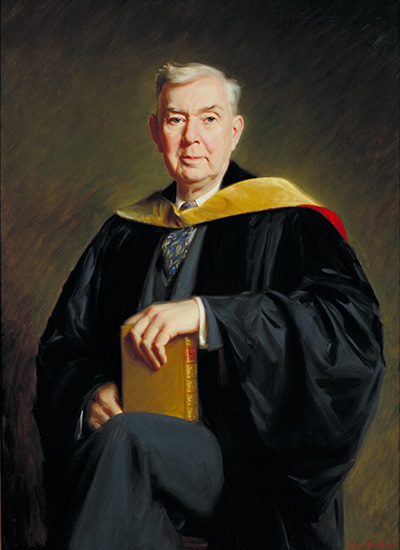Elmer Verner McCollum

Elmer Verner McCollum
- Artist:
- Paul Trebilcock
- Date:
- 1954
- Medium:
- Oil on canvas
- Dimensions:
- 46.5 x 33.5 in.
Elmer Verner McCollum
1879-1967
McCollum, a professor of biochemistry at the Johns Hopkins University School of Hygiene and Public Health, was born near Ft. Scott, Kansas. He received his B.A. and M.A. from the University of Kansas in 1903 and 1904, and a Ph.D. from Yale University in 1907.
McCollum began his career in 1907 as an instructor of agricultural chemistry at the University of Wisconsin. There, he was assigned to analyze cow feed and the animals’ milk, blood, feces, and urine for an experiment to see if cows could survive on a single type of grain. McCollum became interested in diet research, started the first rat colony for nutrition research in 1908, and moved up the ranks to become professor by 1913. He is credited with discovering vitamins A and B through his early experiments.
In 1917, McCollum moved to Johns Hopkins to become professor and chair of the new department of chemical hygiene at its School of Hygiene and Public Health. Spending over twenty-five years at Johns Hopkins, McCollum published 150 papers, including work on fluorine and prevention of tooth decay, vitamins D and E, and the effect of trace minerals in nutrition, including aluminum, calcium, cobalt, phosphorus, potassium, manganese, sodium, strontium, and zinc. With Edwards Park, McCollum discovered the value of vitamin D in the cure of rickets.
McCollum also worked with Herbert Hoover’s U.S. Food Administration to help those who were starving in Europe following World War I. He recommended that the prevailing diet at the time, which consisted largely of white flour bread, potatoes, muscle meat and sugar, be diversified to include leafy green vegetables, fruits, organ meats, milk, eggs, and whole grain cereals.
McCollum also studied the need for minerals in animals. John Lee Pratt, a trustee of the university, sponsored the McCollum-Pratt Institute for the study of this subject on the Homewood campus. McCollum’s public lectures on the nutritional value of a varied diet greatly influenced the nutrition of many Americans.
McCollum was elected vice president of the American Institute for Nutrition in 1937. He was a delegate to the Pan-American Sanitary Conference in Bogotá in 1938, and a member of the international committee on vitamin standards for the League of Nations from 1931 to 1939. He also was a panel member of the food and nutrition board of the National Research Council starting in 1943. McCollum became emeritus professor in 1944.
McCollum was the recipient of numerous honors during his career, including the Howard N. Potts gold medal from the Franklin Institute for distinguished scientific work in 1921; the John Scott Medal from Philadelphia in 1924; and the Charles F. Spencer Award from the American Chemical Society in 1958. In 1951, Johns Hopkins hosted an international symposium to honor McCollum that featured 150 of the world’s leading research scientists. In 1961, he was named a foreign member of the Royal Society of London, the world’s oldest academy of sciences.
"*" indicates required fields
